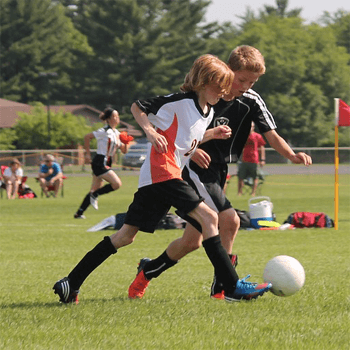It's Youth Sports Month!

April is National Youth Sports Month.
By Nick Wilson, Ambulatory Rehab and Sports Medicine Manager.
With warmer weather on the way, it’s a great time to think about how our kids can prepare to play this season. As a Physical Therapist, I often see kids coming in after an injury – sprained knees and ankles, tendonitis, muscle strains and concussion are all too common. While a segment of these are unavoidable, a number of injuries can be prevented through thoughtful preparation, complimentary training and supportive coaching.
Here are some helpful tips to keep kids on the field and set up a successful season.
- Have a preseason physical with your family doctor. This will help to identify any possible concerns and address them before they pose a problem. Starting the season healthy will assure greater participation and success.
- Be mentally ready. Make sure an athlete has interest in his/her sport and feels confident. A lack of focus or concentration increases risk of injury and puts the athlete in a vulnerable position.
- Warm it up. Allow 15-20 minutes before practice and competitions to go through stretches and warm-up drills. A sport-specific routine that simulates required movements prepares the body for challenges and reduces common non-contact and overuse injuries.
- Mix it up. Focusing too much on any one sport can lead to burnout, overtraining and overuse injuries. Work hard in your favorite sport, but try something different in the offseason. Most great athletes are talented at multiple sports and develop a versatile skill set. Think Tom Brady, a super bowl champion, drafted by Major League Baseball’s Montreal Expos before playing football at Michigan.
- Stay hydrated. Drink water frequently before, during and after a competition. Avoid gulping down large portions all at once. Spacing out hydration provides a greater benefit particularly during hot weather conditions.
- Keep your head in the game. Be mindful of any symptoms such as dizziness, headaches, nausea, and an inability to concentrate or remember the last scoring play. These could be serious signs of a concussion and should be immediately reported to the trainers and coaches. In many cases, rest is the best medicine and can help speed up return to play in the long run. Rest should be physical and mental, with school activities modified during recovery.
- In case of an emergency. Know what the emergency action plan is, including if there is an Automated External Defibrillator on site and where to find it. Athletic trainers are highly trained in on-field first aid, and it’s a good idea to have coaches and parent volunteers trained in CPR.
- Ask for help. If you are ignoring a minor injury, it will likely become a bigger problem and hold back athletic performance. Tackle these early, working with an athletic trainer or physical therapist is a great way to identify your specific needs and stay on track.
Participation in youth sports is a life skill that can serve our kids well into adulthood. By promoting physical activity, discipline, teamwork and mental focus, we’re preparing for a variety of challenges on the road ahead. Most importantly this season, have a lot of fun out there.
Disclaimer
This articles provide general information for educational purposes only. The information provided in this article, or through linkages to other sites, is not a substitute for medical or professional care, and you should not use the information in place of a visit, call consultation or the advice of your physician or other healthcare provider.